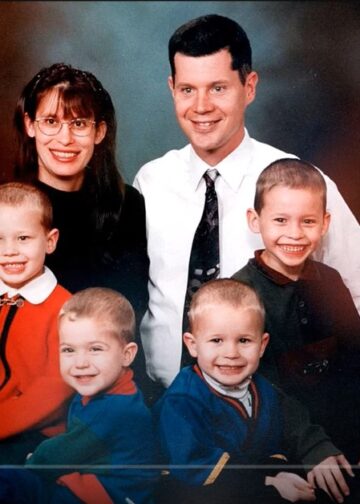Lindsay Clancy, the 32-year-old mother from Duxbury, Massachusetts accused of killing her three children, may have been suffering from postpartum psychosis, an illness in which hallucinations and delusions alter a person’s sense of reality after giving birth, sometimes driving them to harm themselves or their children. The condition is treatable, but it requires emergency psychiatric care, experts say.
Authorities have not confirmed whether mental health was a factor when she allegedly strangled her kids before attempting to kill herself last week, but according to NBC Boston, Clancy did suffer from postpartum depression which is one of several mood disorders that can happen after childbirth. Another is postpartum anxiety.
Postpartum psychosis is the most extreme mood disorder after having a baby, and it’s also the rarest — happening in 1 or 2 out of every 1,000 deliveries, according to Postpartum Support International. The onset of symptoms is sudden and usually happens within the first few days or weeks after childbirth, though they can show up later.
In addition to hallucinations and delusions, postpartum psychosis symptoms include insomnia, irritability, paranoia, restlessness and rapid mood swings.
Thoughts of self-harm or harming others, particularly one’s children, can also be part of the condition but are less common. Among mothers suffering from postpartum psychosis, about 5% will attempt suicide and 4% will commit infanticide, said Michele Davidson, a postpartum psychosis expert and board member of Postpartum Support International.
When these mothers kill, it is often done under the false notion that they are keeping their children from an even worse fate.
“In nearly all the cases that are true postpartum psychosis, there really is not malicious intent,” she said. “It’s basically these women trying to save their babies or take their babies with them to heaven.”
Asking for help can be difficult, said Dr. Phillip Resnick, a professor of psychiatry at Case Western Reserve University.
“Women who have a baby are expected in our society to love that baby immediately,” he said. “If someone has postpartum depression or postpartum psychosis, they may not feel the natural maternal feelings, then they feel guilty and are reluctant to even tell their husband or their obstetrician or pediatrician about their feelings.”
And when patients do bring their symptoms to doctors, they don’t always get an accurate diagnosis, experts say.

Resnick has spent decades studying parents who kill their children and testified for the defense in the case of Andrea Yates, the Texas mother who stunned the nation when she admitted to drowning her five children, one by one, in the family’s bathtub in June 2001. Her children ranged from 6 months to 7 years, and Yates’ attorneys said she was suffering from postpartum depression and postpartum psychosis when she decided that killing her children would save them from going to hell.
“The first time I saw her, three weeks after the homicides, she felt justified and that she had done what was best for her children,” Resnick said.
Months later, after being treated with antidepressants and antipsychotics, Resnick said, “she recognized that she had earlier psychotic beliefs, and of course had terrible regret and severe depression over losing her children.”
Yates was initially convicted of murder before that conviction was overturned and she was found not guilty by reason of insanity in 2006.
She is currently receiving treatment in a mental hospital and has declined annual hearings to determine her eligibility to leave the facility.
In Massachusetts, Lindsay Clancy has been charged with two counts of homicide and three counts each of strangulation and assault and battery.
In a statement released Saturday, her husband, Patrick, said his wife was struggling with an unspecified condition and asked for forgiveness for her after the deaths of their 5-year-old daughter Cora; 3-year-old son Dawson and 8-month-old son Callan.
“The real Lindsay was generously loving and caring towards everyone — me, our kids, family, friends, and her patients. The very fibers of her soul are loving,” he wrote. “All I wish for her now is that she can somehow find peace.”
Pregnant women can discuss ways to lower their risk of developing postpartum psychosis by planning ahead with their obstetrician-gynecologist.
Resnick said the best way to help women who are struggling after they give birth is by letting them know it’s OK to ask for help. “I think the first step is to reduce the stigma of it,” he said. “It doesn’t show a decreased maternal capacity or shameful behavior.”












